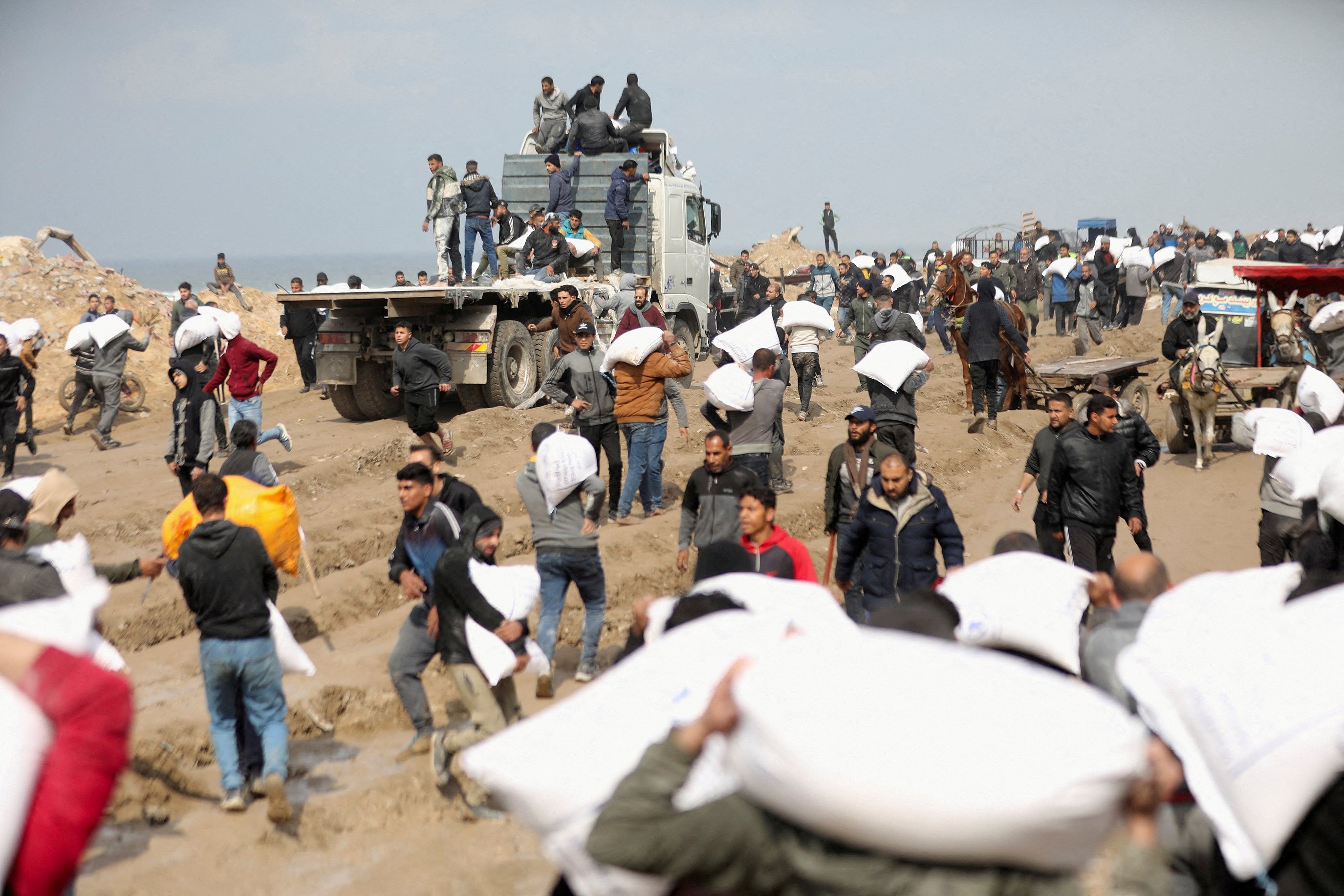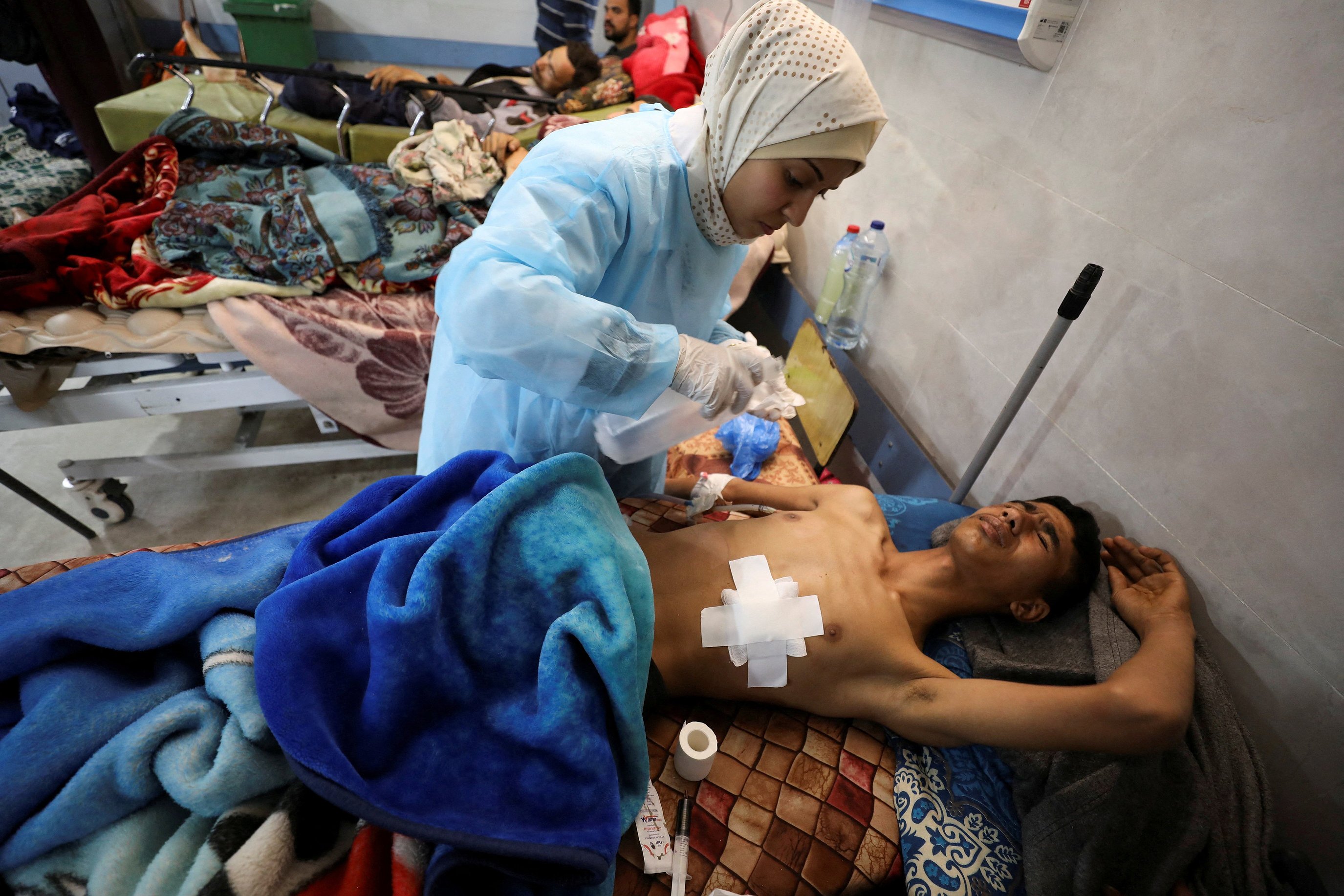Church leaders condemn 'wanton attack' at aid site; Israelis demand hostage release
March 6, 2024 at 10:13 a.m.

JERUSALEM OSV News – Patriarchs and Heads of the Churches in Jerusalem condemned a "wanton attack" by Israeli soldiers against Palestinian civilians in Gaza City who were waiting for delivery of humanitarian aid Feb. 29. Gaza health authorities said the attack left more than 100 people dead.
In the aftermath of "horrifying events" and their "cruel context," Christian leaders condemned the attack "against innocent civilians" in a March 1 statement and called "for the warring parties to reach an immediate and lengthy ceasefire that allows for the speedy disbursement of relief supplies throughout the Gaza strip, and for the enactment of a negotiated release of those held as captives and prisoners."
After the Oct. 7 Hamas onslaught on Israeli southern border communities that left some 1,200 people dead and 253 people taken hostage into Gaza, Israel launched a fierce air and land military attack into the Gaza Strip, which to date has claimed the lives of 30,000 Palestinians, mostly civilians.
As the war enters its fifth month, international aid organizations have warned about the increasing dangers of infectious disease spreading and starvation. Clean water is no longer available, and food supplies have run out – with Palestinians reporting of going days without food, necessitating delivery of supplies through humanitarian aid trucks.
Saying "thousands of dead, wounded, displaced, and the immense destruction cause suffering" of the "small and the defenseless," Pope Francis urged in his Angelus prayer March 3: "Enough, please! Let us all say it: enough, please! Stop!"
"I encourage the continuation of negotiations for an immediate ceasefire in Gaza and in the entire region, so that the hostages may be freed immediately and return to their anxiously awaiting loved ones, and the civilian population can have safe access to urgently needed humanitarian aid," the pontiff said.
Hamas said the Feb. 29 attack could jeopardize talks in Qatar aimed at securing a cease-fire and the release of Israeli hostages the military organization ruling Gaza is still holding. When asked if he thought it would complicate the talks, U.S. President Joe Biden said: "I know it will."
Israeli Rear Adm. Daniel Hagari said in a statement March 3 that an IDF initial review had "confirmed that no strike was carried out by the IDF towards the aid convoy." Earlier he said dozens had been trampled to death or injured in a fight to take supplies off the trucks as "IDF was there conducting a humanitarian operation to … allow the aid convoy to reach its designated distribution point."
As the aid convoy attack received international condemnation, the Patriarchs and Heads of the Churches said that while they were expressing their call for all the innocents suffering from the war, they "conveyed special prayers" for the support of the Christian community in Gaza and expressed solidarity with the "intrepid staff and volunteers of the Anglican-run Ahli Hospital" and their patients.
The church leaders wrote that their "ultimate hope is that the end of hostilities, the release of captives, and the care of the downtrodden will open a horizon for serious diplomatic discussions that finally lead to a just and lasting peace" in the land where "our Lord Jesus Christ first took up his cross on our behalf.
"May God grant us all his grace as we seek the fulfillment of this hopeful Easter vision," they said.
Gaza Holy Family Parish priest Father Gabriel Romanelli, who was in Jerusalem when the war broke out and has been unable to rejoin his parish, has asked for prayers to end the war.
The parish has had to withstand harsh winter conditions with no heat, little food, and a lack of medicine and medical treatment for several people, according to Latin Patriarchate CEO Sami El-Yousef.
"What our people in Gaza have to endure is simply unbearable and beyond imagination," he wrote Feb. 18.
Assistant parish priest Father Youssef Asad, who is in Gaza, has continued to maintain the liturgical services including daily Mass and reciting of the rosary at the parish compound – located in northern Gaza – where most of the tiny Christian community numbering some 800 has been sheltering since the outbreak of the war.
As Jordan and the U.S. have begun air drops of supplies into Gaza, Caritas Germany criticized the move, saying it's "symbolic politics.
"Uncontrolled drops of aid are the worst form of aid. They in no way ensure that the weakened population actually receives the vital support and are therefore an indictment of poverty," the head of the aid organization, Oliver Müller, told KNA, German Catholic news agency on March 4.
He said that only an organized distribution on the ground could ensure that particularly vulnerable people such as children, women, the elderly and people with disabilities were actually reached. "Airdrops lead to distribution disputes and only promote the right of the strongest," said Müller.
Meanwhile in Israel, family members of hostages and thousands of supporters reached Jerusalem March 3 after a four-day march from the southern Israeli border site at Kibbutz Re'im.
In that very kibbutz some 350 young partygoers were murdered by Hamas at an early morning dance rave. The families demanded that Israel reach an agreement with Hamas to release the remaining hostages while they are still alive. Media estimates said some 15,000 people joined the last stretch of the march.
"We call on the decision makers to take the action that will unite the nation. Bring the hostages home. Their lives are in your hands. This is the mission which will return the nation its future," said Nissan Kalderon, the brother of hostage Ofer Kalderon, whose children Sahar and Erez were released in November.
Judith Sudilovsky writes for OSV news from Jerusalem.
Related Stories
Wednesday, December 24, 2025
E-Editions
Events
JERUSALEM OSV News – Patriarchs and Heads of the Churches in Jerusalem condemned a "wanton attack" by Israeli soldiers against Palestinian civilians in Gaza City who were waiting for delivery of humanitarian aid Feb. 29. Gaza health authorities said the attack left more than 100 people dead.
In the aftermath of "horrifying events" and their "cruel context," Christian leaders condemned the attack "against innocent civilians" in a March 1 statement and called "for the warring parties to reach an immediate and lengthy ceasefire that allows for the speedy disbursement of relief supplies throughout the Gaza strip, and for the enactment of a negotiated release of those held as captives and prisoners."
After the Oct. 7 Hamas onslaught on Israeli southern border communities that left some 1,200 people dead and 253 people taken hostage into Gaza, Israel launched a fierce air and land military attack into the Gaza Strip, which to date has claimed the lives of 30,000 Palestinians, mostly civilians.
As the war enters its fifth month, international aid organizations have warned about the increasing dangers of infectious disease spreading and starvation. Clean water is no longer available, and food supplies have run out – with Palestinians reporting of going days without food, necessitating delivery of supplies through humanitarian aid trucks.
Saying "thousands of dead, wounded, displaced, and the immense destruction cause suffering" of the "small and the defenseless," Pope Francis urged in his Angelus prayer March 3: "Enough, please! Let us all say it: enough, please! Stop!"
"I encourage the continuation of negotiations for an immediate ceasefire in Gaza and in the entire region, so that the hostages may be freed immediately and return to their anxiously awaiting loved ones, and the civilian population can have safe access to urgently needed humanitarian aid," the pontiff said.
Hamas said the Feb. 29 attack could jeopardize talks in Qatar aimed at securing a cease-fire and the release of Israeli hostages the military organization ruling Gaza is still holding. When asked if he thought it would complicate the talks, U.S. President Joe Biden said: "I know it will."
Israeli Rear Adm. Daniel Hagari said in a statement March 3 that an IDF initial review had "confirmed that no strike was carried out by the IDF towards the aid convoy." Earlier he said dozens had been trampled to death or injured in a fight to take supplies off the trucks as "IDF was there conducting a humanitarian operation to … allow the aid convoy to reach its designated distribution point."
As the aid convoy attack received international condemnation, the Patriarchs and Heads of the Churches said that while they were expressing their call for all the innocents suffering from the war, they "conveyed special prayers" for the support of the Christian community in Gaza and expressed solidarity with the "intrepid staff and volunteers of the Anglican-run Ahli Hospital" and their patients.
The church leaders wrote that their "ultimate hope is that the end of hostilities, the release of captives, and the care of the downtrodden will open a horizon for serious diplomatic discussions that finally lead to a just and lasting peace" in the land where "our Lord Jesus Christ first took up his cross on our behalf.
"May God grant us all his grace as we seek the fulfillment of this hopeful Easter vision," they said.
Gaza Holy Family Parish priest Father Gabriel Romanelli, who was in Jerusalem when the war broke out and has been unable to rejoin his parish, has asked for prayers to end the war.
The parish has had to withstand harsh winter conditions with no heat, little food, and a lack of medicine and medical treatment for several people, according to Latin Patriarchate CEO Sami El-Yousef.
"What our people in Gaza have to endure is simply unbearable and beyond imagination," he wrote Feb. 18.
Assistant parish priest Father Youssef Asad, who is in Gaza, has continued to maintain the liturgical services including daily Mass and reciting of the rosary at the parish compound – located in northern Gaza – where most of the tiny Christian community numbering some 800 has been sheltering since the outbreak of the war.
As Jordan and the U.S. have begun air drops of supplies into Gaza, Caritas Germany criticized the move, saying it's "symbolic politics.
"Uncontrolled drops of aid are the worst form of aid. They in no way ensure that the weakened population actually receives the vital support and are therefore an indictment of poverty," the head of the aid organization, Oliver Müller, told KNA, German Catholic news agency on March 4.
He said that only an organized distribution on the ground could ensure that particularly vulnerable people such as children, women, the elderly and people with disabilities were actually reached. "Airdrops lead to distribution disputes and only promote the right of the strongest," said Müller.
Meanwhile in Israel, family members of hostages and thousands of supporters reached Jerusalem March 3 after a four-day march from the southern Israeli border site at Kibbutz Re'im.
In that very kibbutz some 350 young partygoers were murdered by Hamas at an early morning dance rave. The families demanded that Israel reach an agreement with Hamas to release the remaining hostages while they are still alive. Media estimates said some 15,000 people joined the last stretch of the march.
"We call on the decision makers to take the action that will unite the nation. Bring the hostages home. Their lives are in your hands. This is the mission which will return the nation its future," said Nissan Kalderon, the brother of hostage Ofer Kalderon, whose children Sahar and Erez were released in November.
Judith Sudilovsky writes for OSV news from Jerusalem.











